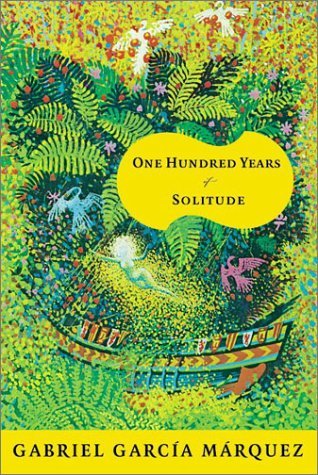Amazon.com Review
"Many
years later, as he faced the firing squad, Colonel Aureliano
Buendía was to remember that distant afternoon when his father took
him to discover ice."
It
is typical of Gabriel García Márquez that it will be many pages
before his narrative circles back to the ice, and many chapters before
the hero of One Hundred Years of Solitude, Buendía, stands
before the firing squad. In between, he recounts such wonders as an
entire town struck with insomnia, a woman who ascends to heaven
while hanging laundry, and a suicide that defies the laws of physics:
A trickle of blood came out under the door, crossed the living room, went out into the street, continued on in a straight line across the uneven terraces, went down steps and climbed over curbs, passed along the Street of the Turks, turned a corner to the right and another to the left, made a right angle at the Buendía house, went in under the closed door, crossed through the parlor, hugging the walls so as not to stain the rugs, went on to the other living room, made a wide curve to avoid the dining-room table, went along the porch with the begonias, and passed without being seen under Amaranta's chair as she gave an arithmetic lesson to Aureliano José, and went through the pantry and came out in the kitchen, where Úrsula was getting ready to crack thirty-six eggs to make bread."Holy Mother of God!" Úrsula shouted.
The
story follows 100 years in the life of Macondo, a village founded by
José Arcadio Buendía and occupied by descendants all sporting
variations on their progenitor's name: his sons, José Arcadio and
Aureliano, and grandsons, Aureliano José, Aureliano Segundo, and
José Arcadio Segundo. Then there are the women--the two Úrsulas, a
handful of Remedios, Fernanda, and Pilar--who struggle to remain
grounded even as their menfolk build castles in the air. If it is
possible for a novel to be highly comic and deeply tragic at the same
time, then One Hundred Years of Solitude does the trick.
Civil war rages throughout, hearts break, dreams shatter, and lives
are lost, yet the effect is literary pentimento, with sorrow's
outlines bleeding through the vibrant colors of García Márquez's
magical realism. Consider, for example, the ghost of Prudencio Aguilar,
whom José Arcadio Buendía has killed in a fight. So lonely is the
man's shade that it haunts Buendía's house, searching anxiously for
water with which to clean its wound. Buendía's wife, Úrsula, is so
moved that "the next time she saw the dead man uncovering the pots on
the stove she understood what he was looking for, and from then on
she placed water jugs all about the house."
With One Hundred Years of Solitude
Gabriel García Márquez introduced Latin American literature to a
world-wide readership. Translated into more than two dozen languages,
his brilliant novel of love and loss in Macondo stands at the apex
of 20th-century literature. --Alix Wilber --This text refers to an out of print or unavailable edition of this title.














